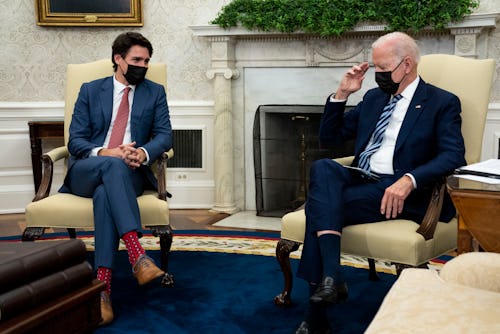Canada acted faster in response to a shooting in the U.S. than the U.S. did
Lawmakers up north want to freeze handgun sales and expand a buyback program. U.S. senators are contemplating joining a Zoom call.

Following the devastating shooting in Uvalde, Texas, that saw 19 children and two teachers killed by a single gunman with an AR-15-style rifle, a nation deeply troubled by the tragedy took action and enacted strict gun control laws to protect its populace.
Unfortunately, it’s not the country where the mass shooting happened.
This week, lawmakers in Canada introduced new gun control legislation that would freeze the buying, selling, importing, and transferring of handguns within the country’s border, according to The Washington Post. If passed, the law would effectively place a cap on the number of guns in the country. It would also seek to further reduce that number through a buyback program, which will offer cash in exchange for banned firearms including AR-15s. The Canadian government has also proposed a “red flag” law that would allow for the temporary removal of firearms from individuals who may be a danger to themselves or others.
That is a serious crackdown, which follows a previous effort in 2020 that made more than 1,500 makes and models of assault rifles illegal in the country — a measure put into place after a gunman killed 22 people in Nova Scotia with firearms acquired in America.
Meanwhile, back in the States, Congress is on break. Despite the tragedy in Uvalde having many elements that require dealing with — from gun control to red flag laws to addressing the inept response by local law enforcement — most senators and representatives left Washington this weekend and won’t return until June 3. Some have managed to set enough times on their schedules to participate in a Zoom call, though. During the virtual bipartisan meeting, which is scheduled for Tuesday, they plan to hash out some middle ground between Democrats who want literally anything at all to be done and Republicans who would rather not.
Some lip service has been paid to the idea of a bipartisan bill on gun control legislation since the shooting in Uvalde. On Thursday, Republican Sen. Pat Toomey of Pennsylvania told The New York Times, “Times change,” indicating there may be room for a compromise. The most likely path to that is a red flag law or expanded background checks that could limit the sales of firearms to people with a certain risk profile, but even that feels unlikely. A recent survey of the 50 Republican senators by the Times found just five consider themselves open to gun reform. At least 10 would be needed to pass a bipartisan bill, if all 50 Democrats supported it.
In the meantime, America’s inability to take even the smallest bit of action to protect people is having spillover effects. Canada’s latest gun control effort is directly related to our failures. “Unfortunately, the reality is in our country [gun violence] is getting worse and has been getting worse over the past years,” Canadian Prime Minister Justin Trudeau said. “We need only look south of the border to know that if we do not take action, firmly and rapidly, it gets worse and worse and more difficult to counter.”
On guns, it appears American exceptionalism means everyone except America is doing something.